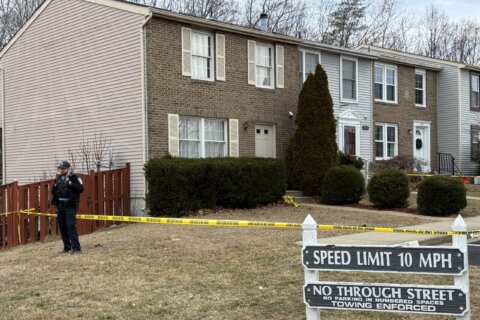This article was reprinted with permission from Virginia Mercury.
Virginia Gov. Glenn Youngkin’s assertion this month that the state’s gun laws are already strong enough for his liking isn’t deterring Democrats from moving forward with major proposals limiting access to firearms.
Policymaking committees in both chambers of the General Assembly have started to advance significant gun control bills while defeating Republican efforts to repeal existing gun restrictions and make guns legal to carry in more places.
On both sides of the legislature, bills to prohibit future sales of assault-style weapons and high-capacity magazines have passed out of committee on party-line votes. So have bills to ban so-called “ghost guns,” untraceable firearms assembled at home often with do-it-yourself kits that can be purchased online.
Other bills have been introduced to impose a five-day waiting period for all firearm purchases, require buyers to prove competency through gun safety courses, create a $500 civil penalty for leaving a handgun visible in an unattended vehicle, remove gun rights from anyone who gets two DUI convictions within five years, prohibit existing assault weapons from being carried in public and require state-issued permits prior to any gun purchase.
Some of that legislation has not yet been heard in committee. But regardless of how Democratic legislators fine-tune the details, few gun control proposals are expected to win the favor of the Republican governor.
On Monday, Youngkin spokesman Christian Martinez said the governor will review all legislation but reiterated a line from Youngkin’s recent State of the Commonwealth speech calling Virginia’s gun laws “already among the toughest in the nation.”
“He’s asking the General Assembly members to hold accountable those criminals that commit crimes with guns by lengthening and making more severe the penalties in order to keep criminals off the streets,” Martinez said.
That echoes much of the criticism raised by GOP lawmakers and gun rights groups in committee hearings, where opponents have characterized the proposals as misguided and potentially unconstitutional due to the U.S. Supreme Court’s newly expanded view of the right to carry firearms outside the home.
But proponents of tougher gun laws appear unswayed, pitching the new bills as common-sense attempts to stop gun violence before it happens rather than doubling down on efforts to pursue lawbreakers.
“We expect the governor to support these measures and to save lives in the commonwealth,” said Lori Haas, a longtime gun violence prevention activist whose daughter was wounded in the 2007 mass shooting at Virginia Tech.
Most votes on gun bills this session have broken down predictably along party lines, with occasionally contentious debate.
In a House of Delegates subcommittee hearing last week on the assault weapon bill, Del. A.C. Cordoza, R-Hampton, one of the few Black Republicans in state politics, pointedly noted that rifles of any kind are rarely used in gun homicides or suicides. Most gun murders, he said, involve handguns being used against Black men.
“Why do you not have a bill that’s going to stop this violence against African Americans?” Cordoza said.
Del. Dan Helmer, D-Fairfax, the patron of the assault weapon bill, said Democrats have filed numerous pieces of legislation aimed at stopping more common forms of gun violence.
“I find it deeply disturbing that the delegate has no interest in stopping 5% of the murders in the commonwealth,” Helmer said. “Because I think 5% is too much.”
Del. Marcus Simon, D-Fairfax, also jumped in, saying he would be happy to debate Cordoza at any time about which party has a better record of trying to prevent gun violence in communities of color.
“This is not an either-or situation,” said Simon, who chairs the House Public Safety Committee. “I can’t let that suggestion lay there. I can’t let that go.”
The assault weapon bill cleared the House Public Safety Committee last week in an 11-9 vote. Its counterpart in the other chamber got a green light in the Senate Courts of Justice Committee Monday in a 9-6 vote.
Defining what assault weapons are has been a challenge for lawmakers in the past. The bill under consideration this year defines them as weapons capable of being used with high-capacity magazines and other modifications like stocks, grips and suppressors. The proposal excludes such weapons made prior to July 1, a concession that allows assault weapon owners to keep firearms they already purchased legally. The restrictions would only apply to assault weapons manufactured after the ban were to take effect.
The Senate committee rejected an effort to repeal Virginia’s so-called red flag law, which was part of a major gun control package Democrats approved in 2020 and allows authorities to temporarily take firearms from people deemed a threat to others or themselves.
Sen. Glen Sturtevant, R-Chesterfield, made a lawyerly case for the bill’s repeal, indicating he sees it more as a question of due process rights and limitations on government seizures of property. But Democrats on the panel reminded Sturtevant — who lost a swing seat in 2019 and returned this year after unseating former GOP Sen. Amanda Chase in a redder district — that he previously thought red flag laws were a promising idea.
“You voted for it in 2019,” said Sen. Creigh Deeds, D-Charlottesville. “Now you want to take it off the books. How come?”
Sturtevant said the bill that passed in 2020 wasn’t identical to the one he voted for in 2019. The law’s problems, he said, have become more apparent over time.
Democrats on the panel disputed that notion, saying the law has now been used more than 1,000 times without any serious legal challenges poking holes in its due process provisions.
Though Youngkin is widely expected to veto the most sweeping gun bills Democrats send to him, more modest proposals could be more difficult for the governor to flatly reject.
Democrats have been pushing to toughen the state’s laws on safe gun storage via bills that would make gun owners liable if a minor gets ahold of a firearm and uses it to commit a crime.
Presenting a bill to allow fines for gun owners who leave handguns visible to passersby in an unattended vehicle, Sen. Dave Marsden, D-Fairfax, said he hopes the governor can support his proposal to reduce what he described as rampant gun thefts from cars. The bill doesn’t come with criminal penalties, he noted, and he specifically excluded long guns to avoid impacting hunters and others who might have a gun rack in the cab of a truck.
“This is a minimalist approach to dealing with a huge problem,” Marsden said.
Gun rights supporters said the proposal effectively fines someone for being the victim of a crime and authorities should instead focus their efforts on catching and prosecuting those who steal guns out of cars.
“Punish them,” said Sen. Mark Peake, R-Lynchburg. “Send a message.”
One proposal has picked up some bipartisan support in early committee votes.
With backing from the Richmond Police Department, freshman Del. Mike Jones, D-Richmond, is sponsoring a bill to ban auto sears, which are small plastic or metal devices that can be used to turn semi-automatic guns into automatics by rapidly emptying all ammunition with a single trigger pull.
That proposal has gotten unanimous support in House committee votes so far, and gun rights groups have said they’re neutral on the matter because the bill largely aligns with federal law that already restricts use of the devices.
Some Senate Republicans, however, raised concerns that the proposal might be overbroad.
“You want these things to be illegal, period, so that criminals can’t get them to harm people with,” said Sen. Richard Stuart, R-Westmoreland, who voted to advance the bill as four of his GOP colleagues opposed it. “You wouldn’t have an objection to somebody shooting a watermelon in a field? You’ve got 1,500 acres and you’re in a 300-acre field of corn and they want to do it for fun.”
Sen. Russet Perry, D-Loudoun, said the bill she’s sponsoring is an effort to address a public safety issue posed by widely available devices that help guns spray more bullets with less control.
“If you’re trying to kill a watermelon,” added gun violence prevention activist Andrew Goddard, “you probably wouldn’t want the gun flailing all over the place anyway.”







